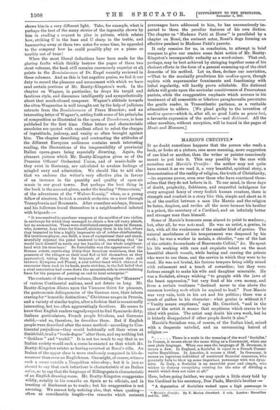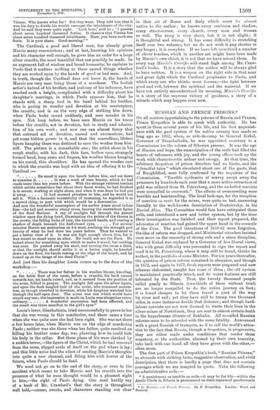MARZIO'S CRUCIFIX.*
Ir no doubt sometimes happens that the person who reads a book, or looks at a picture, sees more meaning, more suggestion of one kind or another, than the writer or painter consciously meant to put into it. This may possibly be the case with ourselves and Marzio's Crucifix the author may not quite have meant it as we read it, a very beautiful, spiritual story, a demonstration of the reality of religion, the truth of Christianity, —its supreme power, even over those who have convinced them- selves that they do not believe in it. To our mind, in these days of doubt, perplexity, flabbiness, and respectful indulgence for every arrogant fancy of every foolish human creature, there is strength and comfort in a story like this, simple and short as it is, of the conflict between a man like Mamie and the religion he hates, despises, and reviles all the more because his brother is a priest, the secretary of a Cardinal, and an infinitely better and stronger man than himself.
Some of Marzio's humonrs seem almost to point to madness ; bat, after all, he was not% mad. He was an artist, a genius, in fact, with all the weaknesses of the smaller kind of genius. The natural morbidness of his temperament was deepened by his work ; he was a worker in metals, a chiseller, " one of the last of the artistic descendants of Benvenuto Cellini," &o. He spent his life working with rare and exquisite talent on the most beautiful church vessels, while hating and cursing the privets who were to use them, and the service in which they were to be used. He was not brutal, his furious tempers being oddly mixed with refinement and a touch of cowardice; but they were furious enough to make his wife and daughter miserable. He was a Socialist, always wishing "to grapple with the jaws of the beast oppression," but very fond of his own money, and from a certain weakness "destined never to rise above the common howling mob which he aspired to lead." Poor Marzio was very vain, both in his art and his politics ; there was a touch of pathos in his character : what genius is without it ? "Vanity means emptiness," says Mr. Crawford, "and in the case of the artist it means that emptiness which craves to be filled with praise. The artist may doubt his own work, but he is bitterly disappointed if other people doubt it also."
Marzio's Socialism was, of course, of the Italian kind, mixed with a desperate unbelief, and an unreasoning hatred of religion
There is a scale in the meaning of the word Socialist.'
In France, it means about the same thing as a Communist, when one uses plain language. When one uses the language of M. Dramont, it means a Jew. In England, a Socialist ie equal to a French Conser- vative Republican. In America, it means a thief. In Germany, it means an ingenious individual of restricted financial resources, who generally fails to blow up some important personage with wet dyna- mite. In Italy, a Socialist is an anarchist pure and simple, who wishes to destroy everything existing for the sake of dividing a wealth which does not exist at all."
Here, before going further, we may quote a little story told by the Cardinal to his secretary, Don Paolo, Marzio's brother :— "A deputation of Socialists waited upon a high personage in • Marzio's Crucifix. By F. Marion Crawford. 2 vols. London: Macmillan and Co. 1887.
Vienna. Who knows what for ? But they went. They told him thatit was his duty to divide his wealth amongst the inhabitants of the city. And he said they were quite right. 'Look here,' said he ; ' I possess about seven hundred thousand florins. It chances that Vienna has about seven hundred thousand inhabitants. Here, you have each one forte. It is your share. Good-morning.' "
The Cardinal, a good and liberal man, has already given Marzio many commissions ; and at last, knowing his opinions and his character well enough, he gives him an order for a large silver crucifix, the most beautiful that can possibly be made. In an argument full of wisdom and broad humanity, he explains to Paolo that it matters nothing to these sacred things whether they are worked upon by the hands of good or bad men. And, in truth, though the Cardinal does not know it, the hands of Marzio are very near being those of a murderer. The foolish artist's hatred of his brother, and jealousy of his influence, have reached such a height, complicated with a difficulty about his daughter's marriage, in which Paolo opposes him, that he stands with a sharp tool in his hand behind his brother, who is gazing in wonder and devotion at his masterpiece, the crucifix, and is on the very edge of striking him down, when Paolo looks round suddenly, and sees murder in his eyes. Not long before, we have seen Marzio on his knees before the crucifix, not in devotion, but in study and admira- tion of his own work ; and now one can almost fancy that that outward act of devotion, unreal and unconscious, had yet some hidden power in it, and that the marvellous, lifeless figure hanging there was destined to save the worker from him- self. The picture is a remarkable one ; the artist alone in his rough studio, with his dark, thin face, hollow eyes, strangely formed head, long arms and fingers, his woollen blouse hanging on his round, thin shoulders. He has opened the wooden case in which the crucifix was kept with an idea of offering it to the Cardinal :
He stood it upon the bench before him, and sat down to examine it It was a work of rare beauty, which he had made more than ten years before. With the strange reticent instinct which artists sometimes feel about their finest works, he had finished it in secret, working at night alone, and when it was done he had put it away It had seemed priceless to him, and he would not sell it. With a fantastic eccentricity of reasoning, he regarded it as a sacred thing, to part with which would be a desecration And now the wonderful masterpiece of his earlier years stood before him—the tall and massive ebony cross, bearing the marvellous figure of the dead Saviour. A ray of sunlight fell through the grated window upon the dying head, illuminating the points of the thorns in the crown, the falling locks of hair, the tortured hands, and casting a shadow of death beneath the half-closed eyes For several minutes Mamie eat motionless on his stool, realising the strength and beauty of what he had done ten years before. Then he wanted to get a better view of it. It was not high enough above him, for it was meant to stand upon an altar. He could not see the Face. He looked about for something upon which to make it stand, but nothing was near. He pushed away his stool, and turning the cross a little, so that the sunlight should strike it at a better angle, he kneeled down on the floor, his hands resting on the edge of the bench, and he looked up at the image of the dead Christ."
And just then his daughter Lucia comes up to the door of the workshop :—
" . . . . . There was her father in his woollen blouse, kneeling, on the brick floor of the room, before a crucifix, hie back turned towards her, his hands raised, and, as it seemed from the position of the arms, folded in prayer. The sunlight fell upon the silver figure, and upon the dark tangled hair of the artist, who remained motion- less, as though absorbed in devotion, while his daughter watched him through the half-open door. The scene was one which would have Amok any ones the impression it made on Lucia was altogether extra-
ordinary A wonderful conversion had been effected, and the result was there manifest to the girl's eyes."
Lucia's lover, Gianbattista, tried unsuccessfully to prove to her that she was wrong in this conclusion, and there came a time when she was quite sure she had been right. She was not there a few hours later, when Marzio was on the edge of murdering Paolo ; neither was she there when her father, quite resolved on killing his brother some day, was planning how he could bide his body in the cellar. But these plans of his were checked by a suddenterror,—the figure of the Christ, which he had removed from the cross, slipped aside of itself on the pad where it lay; and this little noise had the effect of sending Marzio's thoughts into quite a new channel, and filling him with horror of the future, when Paolo should be dead.
We need not go on to the end of the story, or even to the accident which seems to take Mamie and his crucifix into the presence of what he once thought would be a pleasant sight to him,—the sight of Paolo dying. One need hardly say of a book of Mr. Crawford's that the story is throughout well told,—scenes, events, and characters standing out clear
in that air of Rome and Italy which must be almost native to the author ; he knows every sunbeam and shadow, every street-corner, every church, every man and woman so well. The story is very short, but it is not slight; it is thoughtful and strong. It has some difficulty in stretching itself over two volumes, but we do not wish it any shorter or any longer; it is complete. If we have left unnoticed a number of clever touches, which in another art might have been made by Marzio's own chisel, it is not that we have missed them. In every way Marzio's Crucifix will stand high among Mr. Craw- ford's books. It is a story that the author will be always glad to have written. It is a weapon on the right side in that near and great fight which the Cardinal prophesies to Paolo, and which every one who thinks must foresee,—the fight between good and evil, between the spiritual and the material. If we have not entirely misunderstood its meaning, Marzio's Crucifix is a story of the supreme victory of goodness, a story of a miracle which may happen even now.



















































 Previous page
Previous page